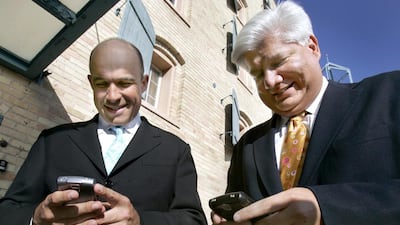■ In this exclusive second-part excerpt from the newly released book Losing the Signal: the Untold Story behind the Extraordinary Rise and Spectacular Fall of BlackBerry, the company faces competition to its game-changing BBM service.
BBM’s success was bound to spark competition, and in 2009 and 2010, a rash of rival mobile instant messaging services began appearing around the world, including WhatsApp, Line, WeChat, and KakaoTalk. Unlike BBM, they worked across multiple platforms other than BlackBerrys and drew millions of new users each month.
The one that irked RIM the most was Kik Messenger. Kik was hatched by a University of Waterloo engineering and mechatronics student named Ted Livingston who had completed three internships at RIM, including time on BBM. In 2009 Mr Livingston decided to forgo his fourth year to develop his fledgling start-up. His initial plan was to develop a music-sharing service that worked with BBM, but after several months he decided to instead create a BBM-like chat application that worked on all smartphones.
__________
The BBM saga
■ The rise of BBM before BlackBerry lost the smartphone race - read the first part here
__________
Mr Livingston approached his former superiors in early 2010 and encouraged RIM to broaden BBM to work on non-BlackBerry devices. With its head start in mobile instant messaging, he believed RIM could crush any rivals if BBM was available on all platforms. He even told RIM in March 2010 he would stop developing Kik if BBM went “cross-platform”.
But the company was not interested. “They absolutely refused and they said, ‘No, we won’t do that’,” Mr Livingston said in a 2013 interview. “To be fair, from their perspective, it was hard. They said, ‘People are buying BlackBerrys for BBM’. That was a real risk”.
Mr Livingston launched Kik Messenger in April 2010 and claimed in court documents he told RIM of his plans. He was even invited to speak at a BlackBerry developer conference that September. But relations changed after he relaunched Kik in October. After 15 days, Kik had signed up 1 million users. At that point, Kik alleged in court documents, senior RIM executives “embark[ed] on a campaign to destroy or seriously harm Kik”. RIM terminated its agreements with Kik, removed Kik from its app store, and sued Kik for infringing on its intellectual property.
Mr Livingston asked one of his investors to intervene – Jim Estill, RIM’s longest-standing outside director. Mr Estill responded by pressing Don Morrison, the chief operating officer, to meet Mr Livingston. According to a December 2010 memo from RIM’s law firm Bennett Jones to the board’s audit and risk management committee, Mr Estill did not disclose his personal interest in RIM’s newest rival to Morrison or the board. The relationship raised a potential conflict of interest, the legal memo warned.
Mr Estill resigned shortly after the conflict issue was raised. He concedes his involvement with Kik put him in potential conflict with his position as a RIM director. “I thought I disclosed it from the start, but I could be mistaken,” he says. “That’s why you resign, you do the right thing.”
The spat with Kik was a warning shot in a larger battle that would play out within RIM over the next year, opening the greatest rift within the wounded company. As it lost its lead in the smartphone race, some RIM executives realised that if they did nothing, BBM would be surpassed by more open mobile chat services. An internal debate over how best to capitalise on BBM’s success as smartphone sales began to falter would open fault lines in the company at its darkest hour.
It was a long night from which the company is still struggling to emerge as it searches for its place in a world it used to rule.
From Losing the Signal: the Untold Story behind the Extraordinary Rise and Spectacular Fall of BlackBerry, by Jacquie McNish and Sean Silcoff
Follow The National's Business section on Twitter

